Jude Knight's Blog, page 134
February 7, 2016
The fate of a fallen woman
 Life in the real Regency wasn’t all Almack’s, balls, and house parties. Even in the households of the rich and titled, a woman’s comfort and happiness depended very much on the character of whatever man headed her household—father, brother, husband. And a highly structured society where women were expected to be chaste and modest, and men to have broad experience, meant an ever-present potential for disaster.
Life in the real Regency wasn’t all Almack’s, balls, and house parties. Even in the households of the rich and titled, a woman’s comfort and happiness depended very much on the character of whatever man headed her household—father, brother, husband. And a highly structured society where women were expected to be chaste and modest, and men to have broad experience, meant an ever-present potential for disaster.
In the lesser ranks of society, a woman might be valued for her skills, her personality, her knowledge, or whatever underpinned the economic contribution she could make to her family. A slip from chastity could be forgiven. Even a child out of wedlock was not necessarily an irretrievable disaster. An extra pair of hands was, after all, an extra pair of hands.
A proper lady
For ladies of the gentry, any smudge on the character threatened the wellbeing of the family. Ladies were decorative rather than useful; educated for little beyond amusing themselves and running a household. Their economic value lay in the family connections created through their marriage, in the children, or more particularly the sons, they would bring into the world.
English landowners practiced primogeniture, a form of inheritance designed to keep an estate unified. Primogeniture meant that lands, titles, and rights were passed intact to the deceased lord’s eldest son. If the right to rule will be passed from father to son, then a family has a great deal invested in making sure that a wife sleeps with no one but, and certainly no one before, her husband. Virginity became a necessary precondition for a good marriage.
Assuring a potential husband of the virginity of a particular maiden meant—as we who read historical romances set in those times know—setting all kinds of restrictions around young ladies. It wasn’t enough to be a virgin; a marriageable girl of gentry class must never be in circumstances that allowed gossips to speculate about what she might, or might not, have done. Reputation was everything. The loss of reputation was the end of a girl’s (and her family’s) hope of a ‘good’ marriage.
Fallen from grace
Our romances offer many paths to those who fall from grace. Her family might rally round to prove our heroine’s innocence. An angry father or brother might force a marriage which becomes a love affair, or the other party to the offence might volunteer. Exile to the country might lead to her true virtue being discovered by a neighbour, or she might be pursued by her seducer who has finally realised that he truly loves her.
In some books, the heroine becomes one of the tens of thousands of women earning her living from the sex trade in Georgian London. Generally a mistress of a man or a succession of men. More rarely, a prostitute in a brothel or in the streets.
That’s the premise for my character, Becky. In the novel, we meet her nine or ten years after her father threw her out. Just think of it. A gently-born girl, raised with few skills beyond flower arranging and embroidery, always treated with courtesy and respect, taught nothing about her own sexuality, suddenly cast into the streets to make her own way. What must that have been like?
In historical romance, our heroines survive the horror and the abuse (or, in some books, manage to bypass it all together) to eventually find the mandatory happy-ever-after. In real life, few were so fortunate. An early death was more likely: from sexually transmitted diseases, complications of pregnancy or abortion, drink and drugs taken to dull the senses, or all of these together.
A Baron for Becky has a happy ending, though not (I hope) an entirely predictable one. In the end, I found myself writing about marriage rather than prostitution. Becky has had a hard life, and it has left scars. Her happy ending does not come easily. But then, that’s life.



February 3, 2016
Partings on WIP Wednesday
This week on work-in-progress Wednesday, I’m inviting you to post about partings. Do your characters leave a lover, a friend, a relative, an enemy? Do they part for an hour, a day, a month, forever? Show me what you’ve got.
(The video clip is the wrong period, but the right mood for my excerpt, which is below.)
In my current work in progress, the hero and heroine both work, and their commitments take them in different directions several times in the course of the novel. I like this parting.
Gren kept up a light patter of social conversation over the meal, and Prue made a valiant effort to contribute, though she was dreading the coming parting, and kept lapsing into silence to just watch David and soak up her last moments with him.
He was quiet, too, and Charrie oscillated from bright and bubbly to morose and silent. Without Gren, it would have been a dismal meal.
When the men got up to leave, Gren suggested to Charrie, “Shall we leave them the breakfast room for a moment, Charity? I know my brother wants to kiss her goodbye, and he doesn’t want to embarrass her in front of her sister.”
Charrie looked from one of the men to the other. “You are brothers?”
“Half brothers,” David confirmed.
Charrie opened her mouth, thought better of whatever she was about to say, and shut it again. Without another word, she left the room, Gren trailing in her wake.”
As soon as the door closed behind them, Prue walked into David’s arms.
“Travel safely,” she said.
“I’ll call for you on my way back.”
“No; I doubt I’ll stay long. I will go back to London. Come to me there.”
“Stay at my place, Prue. Mrs Allen knows to welcome you and make you comfortable. Treat it like your own home.”
“I will. I would like to.”
They kissed, and it was a hello and a farewell all at once. This one kiss would have to sustain them for a month or more. It lasted an eternity and was over too soon.
“I do not want to leave you,” David said at last, drawing his head back but keeping her locked in his arms.
“I do not want you to go. But we each have our duties. Go, David. Finish your enquiries and come home to me.”
David smiled, more a warmth in the eyes than a movement of the lips. “Home. Home is wherever you are, Prue.” He kissed her again, a gentle benediction, then stepped away and opened the door.



January 31, 2016
New release: Samantha Grace’s Resisting Romeo
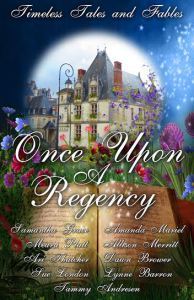 Today, Samantha Grace has joined me to tell us about her story in the new book Once Upon a Regency, and to share an excerpt.
Today, Samantha Grace has joined me to tell us about her story in the new book Once Upon a Regency, and to share an excerpt.
French actress and aspiring playwright Claudine Bellerose recently closed the curtains on a bad romance and has returned to center stage at a small London playhouse where she is about to premiere her first production. Enter Russell Hawke, the new owner of the Drayton Theatre, to deliver disturbing news. If Claudine’s play doesn’t turn a profit, he’ll have no choice except to close the theatre. To further complicate matters, her leading man just suffered an accident and can’t perform. Russell is confident he is capable of stepping in to star opposite the lovely Claudine, but she quickly realizes his horrible acting is threatening to turn her romantic play into a farce. Her only option is to tutor him in his role, and hope she can resist the charms of this handsome Romeo.
Excerpt from Resisting Romeo:
The women took turns showing her how to punch, block, and evade capture if a man leapt out of the shadows.
“Miss Darlington was a splendid teacher,” Rachel said, “but I don’t see how a woman is supposed to flip a man to the ground if he attacks from behind. Won’t he be too heavy?”
Claudine smiled, recalling she had asked a similar question of Regina. “You don’t actually lift him. You throw off his balance. Size can work in your favor. The bigger the man, the harder it will be for him to catch himself, especially if he doesn’t have use of his hands. Let me show you.”
She waved for Anastasia to come forward for a demonstration. Claudine chose her, because she was nearly twice Claudine’s height. Anastasia often stood in for one of the male parts in shows simply because she was tall. A bit of make-up, padding, and a hat could hide her beauty well enough to make it somewhat believable, if she didn’t have many lines.
“I want you to grab me from behind,” Claudine said. Anastasia’s blond eyebrows shot up on her forehead. “I promise not to take you to the ground. I only want to show everyone the steps again.”
“Would you like an actual man for the demonstration?” Mr. Hawke called from the floor.
A delicious shiver ran through her at the thought of him touching her. “That isn’t necessary, sir. Ana will work well enough for our purpose.”
“I wouldn’t mind,” the actress said.
Rachel raised her hand as if Claudine had asked to take a count. “I would like to see Mr. Hawke stand in. I would feel more confident if I can see it is possible with a real man.”
The others agreed.
He was already climbing the stage stairs, and she couldn’t think of a valid excuse to refuse his assistance. Her body tingled in places she really wished it wouldn’t, as his long legs carried him across the stage with a stride that was deliberate, yet unhurried. When he stopped in front of her, a broad smile spread across his face and revealed a dimple in his left cheek. “I am at your service.”
“You may take my place,” Anastasia said and rejoined the group.
Mr. Hawke claimed Anastasia’s spot on stage. “Did I hear correctly that I am to grab you from behind, Miss Bellerose?”
“Yes, Mr. Hawke,” she said, adding in French, “and you better not enjoy it.”
He laughed. “I promise to despise every moment.”
She flinched, having forgotten he could understand her.
“I told you I studied French,” he said. “I also know German, Portuguese, and Spanish. Can you speak with an American accent? I barely understand a word they say. That would be a safe bet if you want to insult me without me becoming the wiser.”
He winked and the other women giggled.
“I wasn’t insulting you,” she said for the benefit of her fellow actresses. If Mr. Hawke closed the theatre after all, she didn’t want to be blamed.
“No, you didn’t, Miss Bellerose. I simply was offering you options in case you want to abuse me in the future.”
She wrinkled her nose at him. “Merci.”
She only knew French and English, and a few German words Tilde had taught her. Growing up, her father had always spoken French to her. He’d never stopped missing his native land, but as he’d often reminded himself, there was nothing left for them in France. Claudine was an infant when her father fled their home with her. When she was old enough to understand, Papa told her about the unrest in France and the rumor that he was to be called before the Tribunal. He said Maximilien Robespierre used the trials as an excuse to execute his political opposition, and Papa had been vocal in his commendation of the violence.
She and her father had arrived safely in England, but a distant cousin turned them away. Papa had always said he left everything behind except his most precious treasure. Sometimes he would pretend he couldn’t remember what it was and ask her to guess. She knew he was teasing about having forgotten, because at night, he would tuck her in bed and whisper, “Mon trésor.” Claudine had always felt fortunate that he loved her as he did.
She took a cleansing breath to bring herself back to the present, and turned away from Mr. Hawke. “Whenever you are ready, I want you to pretend to attack me.”
It must be instinct–or perhaps boys were taught how to grab a woman as part of their education–but it seemed all men tried to hook a woman around the neck when he meant her harm. Mr. Hawke was the exception. He draped his arm across her body, cradling her against his firm chest. His gentleness caught her by surprise, and instead of trying to break free of his hold, she closed her eyes and sank against him.
“If you promise not to hurt me,” he whispered in her ear, “you may take me to the ground.”
Sacre bleu. He smelled magnificent, like a cozy wood fire on a cold night blended with a hint of spice. She swallowed hard and nodded. “W-when a man grabs you, try to get your hand between his arm and your neck, so you have a little room to breathe.” She demonstrated as she walked through the steps. “Now hug his arm to your chest and duck low, throwing your shoulder forward and thrusting out your leg.”
Mr. Hawke pitched forward, tripping over her leg, and landed on the stage with a thunderous bang. She gasped as he winced.
“Mr. Hawke!” Rachel rushed to kneel at his side. “Are you hurt?” She glared at Claudine. “Look what you did. What were you thinking?”
Claudine was frozen, unable to speak or move. He peered up at her. She braced herself for the insults and derogatory names that were sure to come. Any moment she expected Mr. Hawke to rail at her–to shout insults and call her names.
He laughed.
Meet Samantha Grace
 RITA-nominated historical romance author, Samantha Grace, discovered the appeal of a great love story at the age of four, thanks to Disney’s “Robin Hood”. She didn’t care that Robin Hood and Maid Marian were cartoon animals. It was her first happily-ever-after experience, and she didn’t want the warm fuzzies to end. Now that Samantha is grown, she enjoys creating her own happy-endings for characters that spring from her imagination. Publisher’s Weekly describes her stories as “fresh and romantic” with subtle humor and charm. Samantha describes romance writing as the best job ever. Part-time medical social worker, moonlighting author, and Pilates nut, she enjoys a happy and hectic life with her real life hero and two kids in the Midwest.
RITA-nominated historical romance author, Samantha Grace, discovered the appeal of a great love story at the age of four, thanks to Disney’s “Robin Hood”. She didn’t care that Robin Hood and Maid Marian were cartoon animals. It was her first happily-ever-after experience, and she didn’t want the warm fuzzies to end. Now that Samantha is grown, she enjoys creating her own happy-endings for characters that spring from her imagination. Publisher’s Weekly describes her stories as “fresh and romantic” with subtle humor and charm. Samantha describes romance writing as the best job ever. Part-time medical social worker, moonlighting author, and Pilates nut, she enjoys a happy and hectic life with her real life hero and two kids in the Midwest.
Samantha Grace Author Website http://samanthagraceauthor.com
Newsletter http://samanthagraceauthor.com/contact.html
Facebook https://www.facebook.com/Samantha-Grace-264436686918343/
Twitter https://twitter.com/SamGraceAuthor
Pinterest https://www.pinterest.com/samgraceauthor/



January 29, 2016
An fan-tastic habit
 I’m fascinated by the idea of a secret language of fans. I can’t quite see how it would work. Don’t get me wrong; I’m quite prepared to believe that fans were used to flirt with, and that certain gestures meant certain things. I just don’t see how coded signals could be both effective and secret. After all, if everyone knew that a half-opened fan pressed to the lips meant ‘I want your kiss’, no lady would dare press the handle of her fan to her lips in the middle of a crowded ballroom. (And if she and her swain were unobserved, then fan signals were surely unnecessary.)
I’m fascinated by the idea of a secret language of fans. I can’t quite see how it would work. Don’t get me wrong; I’m quite prepared to believe that fans were used to flirt with, and that certain gestures meant certain things. I just don’t see how coded signals could be both effective and secret. After all, if everyone knew that a half-opened fan pressed to the lips meant ‘I want your kiss’, no lady would dare press the handle of her fan to her lips in the middle of a crowded ballroom. (And if she and her swain were unobserved, then fan signals were surely unnecessary.)
For what it is worth, though, here are signals that every chaperon worth her salt should have been looking for, according to a pamphlet published in 1827 by fan-maker Jean-Pierre Duvelleroy:
Twirling the fan in the left hand means “we are watched.”
Carrying the fan in the right hand in front of her face means “follow me.”
Covering the left ear with the open fan means “do not betray our secret.”
Drawing the fan through the hand means “I hate you.”
Drawing the fan across the cheek means “I love you.”
Touching the tip of the fan with the finger means “I wish to speak to you.”
Letting the fan rest on the right cheek means “yes.”
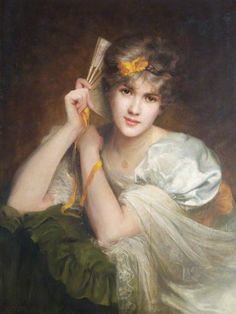
(c) Bruce Castle Museum (Haringey Culture, Libraries and Learning); Supplied by The Public Catalogue Foundation
Letting the fan rest on the left cheek means “no.”
Opening and shutting the fan means “you are cruel.”
Dropping the fan means “we will be friends.”
Fanning slowly means “I am married.”
Fanning rapidly means “I am engaged.”
Touching the handle of the fan to the lips means “kiss me.”
Whether they used them to signal to others or not, ladies—and gentlemen, too, in the regency—found the surface of fans a useful place to write memory joggers: dance steps, song lyrics, rules for card games.
Fans could be made of all sorts of things. Some were of feathers. Some were of flat sticks of bone, ivory, wood, tortoiseshell, or mother of pearl, joined at one end, and strung on ribbon or cord so that the other end flared into the fan shape. Others had ribs of such material and a pleated skin of paper, lace, silk, or fine leather. (Here’s a quiz question. What were chicken-skin fans made from?) They were often exquisitely painted. Whether our regency heroes and heroines signaled with them or not, they would not wish to enter a stuffy crowded ballroom without one.
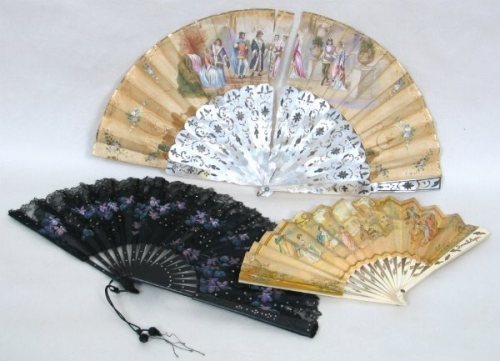 Just for fun, here’s an encounter between the Duke of Roxton and his loathsome cousin, The Comte de Salvan, from Lucinda Brant’s wonderful Noble Satyr.
Just for fun, here’s an encounter between the Duke of Roxton and his loathsome cousin, The Comte de Salvan, from Lucinda Brant’s wonderful Noble Satyr.
“You will not find what you are looking for,” drawled the Duke of Roxton, quizzing glass fixed on Madame de La Tournelle. “That which you desire is not here.”
Salvan spun about and stared up at the impassive aquiline profile.
“Continue to gawp and I will go elsewhere,” murmured the Duke. “Mademoiselle Claude has been beckoning with her fan this past half hour. Sitting next to that frost-piece is preferable to being scrutinized by you, dearest cousin.”
Salvan snapped open a fan of painted chicken skin and fluttered it like a woman, searching gaze returning to the sea of silk and lace.
“To be abandoned for that hag would be an insult I could not endure, mon cousin. You merely startled me.”
“I repeat, your search is fruitless.”
“Ah! You see me scanning faces. I always do so. It is nothing,” Salvan said lightly. “Did you think me looking for someone in particular? No! Who—Who did you think I was looking for?”



January 26, 2016
Secondary characters on WIP Wednesday
He’s doing it again, and I refuse to let him have another blog post. I always intended some of my characters to play a role in a number of books — either always as secondary characters, or in lesser roles when they weren’t taking centre stage. But the Marquis of Aldridge is trying to horn in on Prue and David’s love story. I’m not going to talk about him. Or his mother, who also

Lord Jonathan Grenford
pops up in places that are not always convenient.
But I am going to give you an excerpt with another secondary character for Embracing Prudence. Please show me yours? Usual rules. Nine to ten lines, and I’m not too strict about it. And share away on Facebook and Twitter as much as you please!
So here is Aldridge’s younger brother, Lord Jonathan Grenford, joyously helping his half-brother David with the murder investigation. He has just been to try his charm on the Earl of Selby’s mother and aunt, and is reporting that they all but threw him out.
After that, the two women cut the visit short. Gren was escorted firmly to the door, and Miss Remington informed him that she would be speaking to his mother, a threat that Gren found highly amusing.
“Mama, if she even receives the woman, will inform her that it is about time I had a hobby.”
But Gren’s report was not over.
“So I wandered around to the kitchen entrance, to thank the cook for her particularly delicious almond macaroons. And she insisted on making me a cup of tea and serving me some more. I will need to visit Mama.” He had a bite of his bun while his listeners pondered the non sequitur.
Prue decided to give him the satisfaction of asking. “Very well, Gren. Why do you need to visit Her Grace?”
“I might have promised to the cook a position in one of Mama’s houses,” Gren’s eyes were dancing. “She isn’t very happy in the Selby household. Not only are they unappreciative of her talents, the whole household knows that they don’t have a feather to fly with and expect to be jobless at any time, and—besides—she is almost certain that one or both of the old harridans greased the steps that the former Earl of Selby slipped to his death on.”
Satisfied with his verbal bombshell, he finished the bun.



January 20, 2016
Beginnings in WIP Wednesday
I’m toying with beginnings for the next two projects as I come to the end of the first draft of Embracing Prudence. The Bluestocking and the Barbarian begins with my hero in a family group riding hell for leather for London, 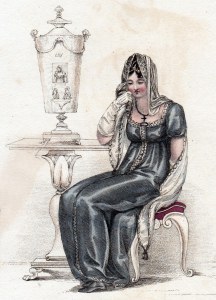 heading for his grandfather’s death bed. He needs to do some fancy trick riding to scoop up a child from the middle of the road and return it to the lady at the gates of the orphanage where the child belongs.
heading for his grandfather’s death bed. He needs to do some fancy trick riding to scoop up a child from the middle of the road and return it to the lady at the gates of the orphanage where the child belongs.
A Raging Madness begins in one of three places: at the funeral of the mother of a deceased fellow officer of Alex Redepenning, in the home of the bereaved daughter-in-law, where she hears her relatives plan to put her in Bedlam, or in Alex’s hotel bedroom when she flees to him to ask for help.
How about giving me up a few lines of beginning? The first chapter, if you will, or any other chapter if you prefer. And don’t forget to share!
 Here are the first few lines of Embracing Prudence.
Here are the first few lines of Embracing Prudence.
From within the protective camouflage of the gaggle of companions, Prudence Virtue watched her sometime partner and one-night-only lover drift around the banquet hall. No-one else noticed him. Like the shadow he named himself for, he skirted the edges of the pools of candle light, but even when his self-appointed duties moved him close to a group of guests, they looked right past him. None of the privileged, not even the host and hostess, noticed one extra footman.
He was very good. He had the walk, the submissive bend of the head, the lowered eyes. She had overlooked him herself for the first half hour that she sat here, just one more brown-clad, unimpressive companion among a dozen others, waiting patiently in an alcove for the commands of an employer.
But Prue’s body was wiser than her mind, and left her restless in his presence until her eyes caught so many times on this one footman among all the others she began to take notice.



January 15, 2016
Once upon a time I invented a rake
I joke that my creative process relies on the plot elves. I sit down to do my 500 words, or 1000 words, or 2000 words, or whatever the target for the day is, and the characters start acting out the scene disclosing all sorts of things the plot elves have been working on in the background.
The truth is that my creative process is a mystery to me. The invention of my Marquis of Aldridge is a case in point.
Here’s his very first appearance on a page, in my work-in-progress, Embracing Prudence. David Wakefield, base-born son of the Duke of Haverford, is investigating a case of blackmail.
A knock on the door heralded Aldridge’s arrival. A maid showed him into the private parlour. He’d clearly been treating her to a display of his facile charm; she was dimpling, blushing, and preening.
David examined him as he gave the girl a coin “and a kiss for your trouble, my darling.” The beautiful child had grown into a handsome man. David had heard him described as ‘well-put together, and all over, if you know what I mean.’ The white-blonde hair of childhood had darkened to a light brown, and he had golden-brown eyes under a thick arch of brow he and David had both inherited from their father.
Aldridge navigated the shoals of the marriage market with practiced ease, holding the mothers and their daughters off while not offending them, and carrying out a gentleman’s role in the ballroom with every evidence of enjoyment.
But his real success, by all accounts, was with bored widows and wives, where he performed a role in the bedroom with equal enjoyment. Society was littered with former lovers of the Merry Marquess, though he had the enviable ability to end an affair and retain their friendship.
He ushered the laughing maid out of the room and closed the door behind her, acknowledging David’s appraisal with a wry nod.
“Wakefield. You summoned me. I am here.”
David ignored the thread of irritation in the young aristocrat’s voice.
“I have some questions I wish to ask about the story your brother tells.”
Uninvited, Aldridge grabbed a chair and straddled it, resting his chin on his forearms. “Our brother,” he said, flatly.
I should, perhaps, explain that I’ve been creating an entire fictional world these last five years, peopled with enough characters for at least the forty books for which I have plot lines. Many of the characters are just names in my database and spreadsheet, but if I need a mother, or a cousin, or villain, or an old school friend, I look there first before I invent someone new. So when David needed a case to investigate, I involved his patroness, the Duchess of Haverford, and her son Aldridge came with the territory.
I knew Aldridge existed, and I knew he was a rake. There’s a crusading social zealot growing up in my world who will one day need a hero who is as much a challenge to her as she is to him. But I hadn’t given him much more thought than that, till I inserted him into David and Prue’s story. I generally start a book with tidy character descriptions (eight pages for protagonists and major antagonists, and one page for anyone else with more than a walk-on part), a plot outline, and maps. After I start, though, the plot elves take over and anything might happen. And so it was with Aldridge.
Very soon, he proved to be a larger part of Prue’s past than David knows. He is also deeply concerned about his younger brother Jonathan, who becomes David’s assistant in the investigation. What with one thing and another, by the time Prue, Jonathan, and David disappear from England, Aldridge has enough guilt riding him to dive into a bottle and hide there for months, as explained in this deleted scene from A Baron for Becky.
“Cousin, I don’t believe you’ve been sober since June—this business with Jonathan is not your fault, you know.”
Aldridge shook his head. He didn’t agree. Jonathan was his younger brother, and he’d promised to keep him safe. He’d promised Mama.
“Do you remember the frogs in your tutor’s bed?” Rede asked.
Aldridge was not fooled by the seeming change of subject. He’d taken the blame for that, though the prank had been Jonathan’s. “The tutor was a vicious fool, and would have beaten Jonathan until his arm fell off. And His Grace would have done nothing; Jonathan was only the spare. Disciplining me was reserved to His Grace, and the tutor would not disturb him for such a minor infringement.”
It was Rede’s turn for the dismissive shake. “Jonathan’s not nine any more, Aldridge. The scandal was of his own making; quite deliberately from what I heard. ”
Aldridge grinned. He was worried, and he felt guilty, but he still admired his brother’s strategy. “He wanted to travel and His Grace said ‘no’. So Jonathan arranged to be exiled. Pudding-brain. Doesn’t he know there’s a war on? I hope David finds him.”
Rede slid the brandy decanter towards him. “David? David went after his… after a lady that he loves.”
Aldridge busied himself pouring another glass and exerted every ounce of control not to tip it straight down his throat. There was the crux of it—not Jonathan’s defection, though Aldridge still believed he should have been able to prevent it. But Aldridge’s contribution to the loss of his other brother, his father’s bastard; Aldridge’s treatment of the woman David loved.
“Did you not know? She went with Jonathan. And I don’t think David will ever forgive me, Rede.”
I had just realised what a crucial part Aldridge played in Prudence’s backstory and the major misunderstanding between David and Prue when my group of Historical writers, the Bluestocking Belles, embarked on a three week marathon of interactive story telling on Facebook. We invented a magical inn that allowed our fictional worlds to collide, and brought along our characters for an impromptu party.
I contributed one drunk and depressed Aldridge to the fun, and it was fun! Poor Aldridge. He had a frustrating time, with his advances to one lady after another being rejected, sometimes violently.
Then along came Mrs A. Mrs Angel is the invention of Catherine Curzon, and she is a wonderful character, mistress to princes, owner of brothels, and a rollicking good-time girl. Aldridge’s pursuit of Mrs A. jumped from thread to thread and took days, with one accident after another keeping him from his goal.
I decided to write it up as a light-hearted romp; the story of Aldridge and the golden-hearted harlot who saved him. But I soon realised that Aldridge needed quite a different kind of experience at this point in his life. Becky began to take shape in my mind – a broken bird, rescued by Aldridge but carrying scars from her past experiences. The book became Becky’s story, and the elderly baron Catherine and I had first envisaged became Hugh, Aldridge’s best friend, a man with his own scars.
And so, in the end, Becky and Hugh took over what began as Aldridge’s story, and A Baron for Becky is a far better book than I originally intended.
Where to from here? I have a vague idea, but quite a distance to travel first. In the main stream of my novel writing, I have yet to finish 1807. Aldridge will be a bit player in several more books before 1814, when his own story begins with a social reforming spinster bursting into his bedroom demanding that he come save his bastard son from a molly brothel. I’m looking forward to finding out what happens next.



January 13, 2016
Curious facts on WIP Wednesday
 Authors often joke about how a law enforcement agency might react to their Internet search history. We need all kinds of curious facts and odd pieces of knowledge to give strength and depth to our plots, and make them accurate. Even writers who set their stories in a totally imaginary world of fantasy or science fiction need their creations to be believable, and historical fiction writers spend huge amounts of time checking the details of background, custom, clothing, manners, and history so that they don’t make errors that will throw a knowledgeable reader out of the story.
Authors often joke about how a law enforcement agency might react to their Internet search history. We need all kinds of curious facts and odd pieces of knowledge to give strength and depth to our plots, and make them accurate. Even writers who set their stories in a totally imaginary world of fantasy or science fiction need their creations to be believable, and historical fiction writers spend huge amounts of time checking the details of background, custom, clothing, manners, and history so that they don’t make errors that will throw a knowledgeable reader out of the story.
Some of it makes its way into the story. Some of it never does. I spent three days this month researching historical Liverpool for the two chapters where David and Gren pursue investigations in that city, and barely any of it actually appears on the page. Sigh. And a further hour’s research into canals just confirmed that a single sentence was historically possible.
Today, on work-in-progress Wednesday, I’m asking you to post about a curious fact or an interesting piece of research, and show us an excerpt in which you used (or didn’t use but were aware of) that information.
Mine is from Embracing Prudence and is the only place my Liverpool research provide context and texture to the story.
Liverpool was large and busy and smelly. England’s second biggest port, dominating Bristol and rivalling even London, its docks were a forest of ships’ masts and spars surrounded by a cacophony of loading and unloading that began at first light and continued until it was too dark to see.
“Abolition will hit them hard,” Gren observed, as they strolled to the offices of the man they had come to see.
“Disgusting trade,” David observed. Liverpool had built its wealth on the Triangle Trade: cheap manufactured goods and guns from its hinterland to Africa, to be traded to chiefs for the live bodies of their enemies. Men, women, and children across the Atlantic to the islands of the Carribean, to be traded for sugar and cotton and other tropical products. Sugar and cotton back across to Liverpool, to be fed into the manufactories that supplied the United Kingdom and beyond.
But even in Liverpool, hard though many had argued the economic costs of stopping the trade, support for abolition had grown these last twenty-five years. The Abolition Bill currently before Parliament was in its final readings, and likely this time to pass where so many had failed. Had some of the local merchants seen the signs of the times and decided to diversify? And applied the same ruthless disregard for human life to the fur trade?
They climbed the stairs to the offices in a substantial building off one of the main thoroughfares leading up from the river. Atkins had a sign on the door saying ‘Thos. Atkins, Discreet Enquiries’, and two clerks in the outer office.



January 7, 2016
Secret Realm New Year’s blog hop
Whether you are hopping through the blogs or are a regular visitor to these pages, today you can enter to win here, and click on through the blogs to enter for more great prizes. Or go to the event page, here.
Happy New Year. In 2016, I’m planning to publish at least three novels, plus at least two novellas and other shorter stories and vignettes. First up is a surprise with the Bluestocking Belles in March, to be announced in February (so watch for it. In May, I’m releasing Embracing Prudence, which tells the story of Prue and her colleague and lover David the thief taker—sorry: David prefers the term enquiry agent.
 I hope you’ll join me often in 2016 to talk about books, and writing, and historical research.
I hope you’ll join me often in 2016 to talk about books, and writing, and historical research.
Would you like to win Candle’s Christmas Chair, Farewell to Kindness, or A Baron for Becky? I’m giving away twelve ebooks through a Rafflecopter. To enter, all you have to do is read the excerpt below and answer the question. You’ll get a bonus entry for subscribing to my newsletter, and another for following me on Amazon. When Rafflecopter chooses the 12 winners, I’ll send them a message asking which books they want.
Here’s the excerpt, from A Baron for Becky.
Becky and Sarah were waiting when Lord Overton arrived at two o’clock, just as he had promised. Becky paused on the doorstep. He had borrowed a curricle from Aldridge; she recognised the horses. It would be a tight fit for the three of them.
Sarah had no such qualms, and was already down in the street, renewing her acquaintance with Prince and Brown Beauty, chattering away to the groom Lord Overton had also borrowed, another old acquaintance.
“We’ll tuck Sarah between us where she will be warm, and out of the wind,” Lord Overton said, correctly interpreting her concern. “Neither of you are large. We will fit.”
It was a tight fit, and at first Sarah shrunk away from Lord Overton. Soon, though, she was telling him everything she knew about the horses, as they made their way through the streets to the park, the groom up behind.
With his focus divided between Sarah and the horses, Becky was free to watch him, and to wonder what life would be like as his wife. If he continued to be kind and respectful, if he were not putting on an act, if this plan of Aldridge’s worked…
By the end of the drive, Sarah and Lord Overton were friends, and he cemented the friendship by producing sugar cubes for her to feed the horses. She went to her governess and the schoolroom in full charity with him.
Lord Overton stood in the hall, smiling, watching her skip up the stairs.
“Do you intend to charm me by charming my daughter, Lord Overton?” Becky challenged.
He turned, laughing. “Is it working, Mrs Winstanley?” Then, serious again, “But no, I wanted to charm her, as you call it, for her own sake. Is she always so quiet and good?”
“She does not take easily to strangers,” Becky said. Sarah had reason to be wary, and Becky would do well to remember it. Still, Lord Overton’s attempt to win Sarah’s favour was more to his credit than not.
He returned for dinner that night, and it became the pattern for their days: an outing in the afternoon, dinner in the evening, and afterwards, cards, chess, or reading together. And they talked. Lord Overton had read many of the same books she enjoyed. He agreed with her views on enclosure. She did not share his confidence in the military genius of General Wellesley, but acknowledged that his own background as an army officer gave him the edge in judging such a thing.
She asked about his estate, and about his daughters, who would be her daughters, too. Perhaps. If she dared…
And at night in her bed, she wondered whether his shoulders were as broad, his hips as slender, as they looked.
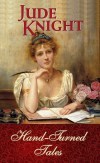 I also have a free book for you. Hand-Turned Tales contains three short stories and a novella. Just click on the link to find some of the eretailers where you can download it. And I’ll give away a print copy of Hand-Turned Tales to a random commenter.
I also have a free book for you. Hand-Turned Tales contains three short stories and a novella. Just click on the link to find some of the eretailers where you can download it. And I’ll give away a print copy of Hand-Turned Tales to a random commenter.
But the hop isn’t over. There are more great prizes today, and even more in the days to come.
So thank you for visiting, and good luck at Lauren Royal’s website, on the next stop.
Or link back to the event page, here.



January 6, 2016
Descriptions in WIP Wednesday
 I’ve spent a large part of my adult working life in commercial writing, creating and editing legal, government, financial, and business documents. When I decided to commit to writing fiction again, I was concerned that the pared back, plain language style I had cultivated so assiduously would bleed over. Could I write a description? Could I transport my readers into another place; cause them to build pictures in their mind of rooms and landscapes and people? I worried.
I’ve spent a large part of my adult working life in commercial writing, creating and editing legal, government, financial, and business documents. When I decided to commit to writing fiction again, I was concerned that the pared back, plain language style I had cultivated so assiduously would bleed over. Could I write a description? Could I transport my readers into another place; cause them to build pictures in their mind of rooms and landscapes and people? I worried.
I find that if I strongly visualise something myself, then simply describe it as clearly as possible, it seems to work. And so I go looking for visual inspiration, much of which finds a home on my Pinterest pages.
Below is a description from Embracing Prudence. David is calling on a client. As always, I invite you to post excerpts from your work in the comments, and to share through twitter, facebook, or wherever else you like.
David was shown through a lofty hall by an equally lofty butler, and into a parlour decorated in the Egyptian style. Last month, he had met Rede at the solicitor’s office and then had tea with him at his club, so missing the glory of the former Earl of Chirbury’s decorating style.
The room had been painted black to above head height, with gold detailing. Above that was a frieze easily two feet high; Egyptian pharaohs, slaves, mummies, soldiers, and gods painted in garish colours marching endlessly around the room, with a sublime disregard for any kind of sense or story.
The furniture carried on the theme, with blocky claw-footed pieces upholstered or painted in reds, greens and golds. Every surface, including a couple of ornately painted plinths, carried more Egyptian-inspired decoration: sphinxes, pharaohs’ heads, vases, mirrors in frames; even the candle sconces were sphinxes with holders embedded in their heads.
The door opened behind him; heavier steps than the butler’s.
“It’s ghastly, isn’t it?”








